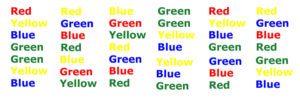Quick Hits
Daily brief research updates from the cognitive sciences

Last year I reported on how pollution and bad air in offices correlates with lower performance and productivity. Something business should take note of.
A study out of the University of Tsukuba has looked into decision-making under physical fatigue. Now this may seem to be off on a tangent and not related to the business world but they were specifically trying to look at what specifically clouds judgement under fatigue.
We know that when under fatigue, during or after strenuous activity, that so-called executive function decreases. Executive function is the ability to control impulses and control cognitive processes. One test of this is the Stroop test. The Stroop test flashes coloured words such as “red” but the text is either in the same colour or a different colour (e.g. red or red). If the text matches the text colour you click yes. If it doesn’t you click no.

This is tricky at the best of times and is often used as an executive function test in its own right.
When doing strenuous exercise, performance on this drops, often dramatically. The question now is, is it, because of attentional issues, a change in brain function to be able to exert yourself, or reduced oxygen?
The researchers devised an experiment whereby they were able to manipulate oxygen supply to the brain and thereby see whether it was just the oxygen levels that influenced this. And yes, when oxygen supply remained stable during exercise, performance on the Stroop test was influenced much less.
So, this shows that it is the oxygen supply that clouds judgment – or ability to deliver oxygen to critical executive regions of the brain.
That is important because that shows that oxygen supply to the brain is important for all decision-making in all conditions.
Take note businesses particularly those with those muggy meeting rooms where executives make critical decisions●

Andy Habermacher
Andy is author of leading brains Review, Neuroleadership, and multiple other books. He has been intensively involved in writing and research into neuroleadership and is considered one of Europe’s leading experts. He is also a well-known public speaker speaking on the brain and human behaviour.
Andy is also a masters athlete (middle distance running) and competes regularly at international competitions (and holds a few national records in his age category).
Reference
Genta Ochi, Ryuta Kuwamizu, Kazuya Suwabe, Takemune Fukuie, Kazuki Hyodo, Hideaki Soya.
Cognitive fatigue due to exercise under normobaric hypoxia is related to hypoxemia during exercise.
Scientific Reports, 2022; 12 (1)
DOI: 10.1038/s41598-022-14146-5
More Quick Hits
Smartphones Improve Your Memory
Quick HitsDaily brief research updates from the cognitive sciencesany people believe that using smartphones and other electronic devices is ruining our memories and ability to think or simply use our brains. Research has shown a more nuanced...
How Meditation Helps Pain In Your Brain
Quick HitsDaily brief research updates from the cognitive sciences es, meditation can help with pain by changing your experience of it. I reported on that here. Another piece of research just published shows that how experienced meditators and...
When Stress Is Good For Brain Functioning
Quick HitsDaily brief research updates from the cognitive sciences tress gets a bad rap – understandably it is a negative experience and has been shown over long periods of time, and with high intensity, to cause multiple negative outcomes, from...
Put Your Smartphone Down and Let your Mind Wander – You’ll Be Happier
Quick HitsDaily brief research updates from the cognitive sciences here’s a lot been said about smartphone usage and how it can be used and abused. Most of this concern revolves around usage in children or teenagers, however, with some research...
The Amazing Impact Of Reaching Out To Your Old Friends
Quick HitsDaily brief research updates from the cognitive sciences few weeks ago a friend I hadn’t seen for about 10 years sent me a message and asked if I had time to meet up. I was elated. "Sure," I immediately messaged back, "when and where?!"...
Really? Belief In Conspiracies Not Increasing
Quick HitsDaily brief research updates from the cognitive sciences e may feel like we’re in an age of conspiracy theories, that social media is turbocharging the wild and wacky theories, and the so-called information bubbles are sending people down...






